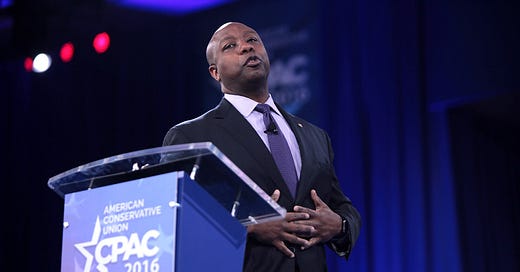The Truth of Tim Scott's Opportunity Zones
It seems like Tim Scott isn't even trying to have an honest conversation.
Tim Scott doesn't have a positive message. His approach is somewhat disingenuous since he happily oversimplifies the reality of Black Americans through frames that are solely meant to attack left-wing politics rather than a frame that explores pain and triumph. To explore that pain, means honestly reassessing the triumphs.
Black America's complexities do not fit in left wing -right wing framing as Tim Scott wants his audience to believe. This is an old tactic that goes back to myopic American racists calling human rights movements “socialist” or “communist” to create permission structures that ignore the lives of their fellow citizens.
"The Truth Of My Life Disproves The Lies Of The Radical Left"
- Tim Scott
African Americans from all over the political spectrum have formed a consensus that real anti-Black racism has been enshrined into the legal and cultural structures of the American dream. This is a part of why the Reagan Republican party fails to recruit significant numbers of conservative Black Americans into their ranks.
On the surface, it seems Tim Scott chooses to ignore this part of the conversation for his own personal gain.
Thus, if Tim Scott were to become president (or even vice president) by engaging in a process of diluting and distorting the reality of his people, then he will need to be reminded of every instance of continued racism in America during his term in office.
Tim is going to parade his attempt to reinforce failed policies around opportunity zones. In essence, opportunity zones are incentive structures that target capital gains taxes. In an ideal world, investors use the windfall stemming from this tax break to invest in underserved communities. The process would involve increasing the value of the land through commercial and housing construction. The infusion of new business and recreation ideally creates a realm of opportunity and development that would help grow a local economy. However, the problem with this approach (like much of the flawed trickle-down theory) is that investors live to serve an unfair market that inevitably pushes lower-income individuals and families out of communities in favor of higher-income people who can pay the new market rate. A cycle of poverty is perpetuated as a class of people who have the funds and networks to take advantage of market opportunities that displace people who have lived in an area for generations.
As is the case in my hometown of Baltimore, Maryland.
The development of Port Covington leaks the excesses of Republican’s religious allegiance to market forces:
Baltimore, Maryland, is just one of many similar examples. The Port Covington neighborhood drew particular attention when it was revealed that Maryland’s Republican governor and part-time real estate developer, Larry Hogan, revised his nominations to include the tract, despite being told by officials that it did not qualify. The community had relatively few people, was not poor, and was surrounded by mostly high-income tracts, but since a sliver of a parking lot within Port Covington fell within a qualified tract, it gained OZ status after assiduous lobbying efforts on behalf of a project bankrolled by Goldman Sachs’s Urban Investment Group and Under Armour founder Kevin Plank. (It was subsequently found that the overlap was actually due to a mapping error, but the tract remained an OZ.) The project, already underway with the aid of state and city tax breaks before designation, aimed to build a hotel, offices, market-rate apartments, and retail aimed at millennials. In the words of urban studies scholar Robert Stoker, Port Covington’s designation as an OZ is “a classic example of a windfall benefit.”
Here is an example of how opportunity zones are manipulated by investors so that tax breaks are utilized to develop property that isn’t even in the same location of underserved and impoverished residents. Once again, powerful people with more access and information choose to manipulate the market and also create a system of waste, fraud, and abuse within the governing bodies that many of them disdain. Sometimes conservatives accuse left-leaning ideas of having this flaw.
On a superficial level, opportunity zones look like an improvement because new development is enabled. However, taking a deeper look at the policies reveal that cycles of poverty and systemic racism are reinforced based on a myopic market vision that somewhat sheds social Darwinism, especially when those ideas are forced to consider the fate of displaced individuals who have a generational connection to land that is bought by million-dollar investors.
Tim Scott invokes his grandfather when articulating his vision. This is all good to bring up family, but it is frighteningly disingenuous because he fails to look at the complexities of his policy and how it fosters doom loops that originate from racial and income segregation. In a nation that has trained people to pathologically blind to the life and experiences of impoverished and minority communities, public initiatives can allow broader participation and perspectives for development, instead of putting that power in the hands of a demographically skewed and self-aggrandizing investor class.
I would be very open to hearing Tim Scott’s conservative approach if it wasn’t steeped in doctrine that has provably failed to understand how market forces have intensified economic dislocation (that then becomes exponentially worse for an underclass of Americans mired by systemic racism). Someone with his position, networks, and access to information needs to deeply consider this reality. If not, then he is just promoting failed policies built out of blind spots regarding the reality and history of people of color in America as well as the prevalent practice of market manipulation.







There's a term that can no longer be used in polite society that the slaves came up with to describe guys like Tim Scott. Two words, the first one was "House..." and the other one can't be said.
"The Wire" tackled this topic very memorably in Seasons 2 and 3 as I recall.